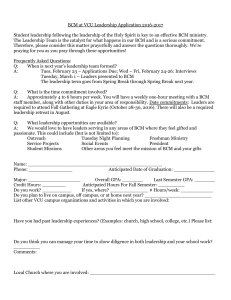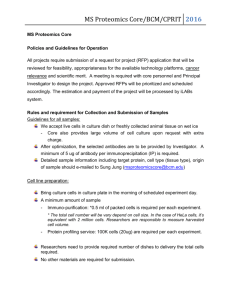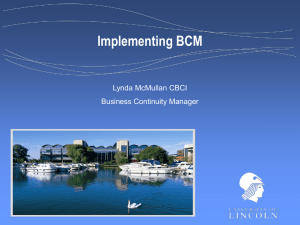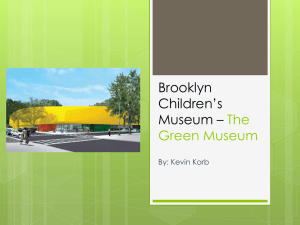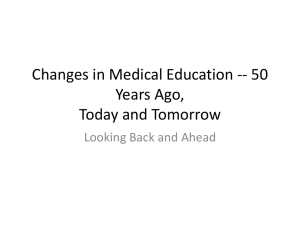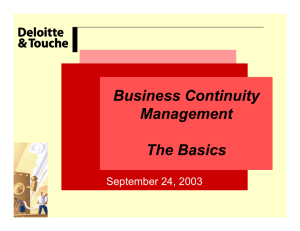Medical School Interviewing Workshop
advertisement
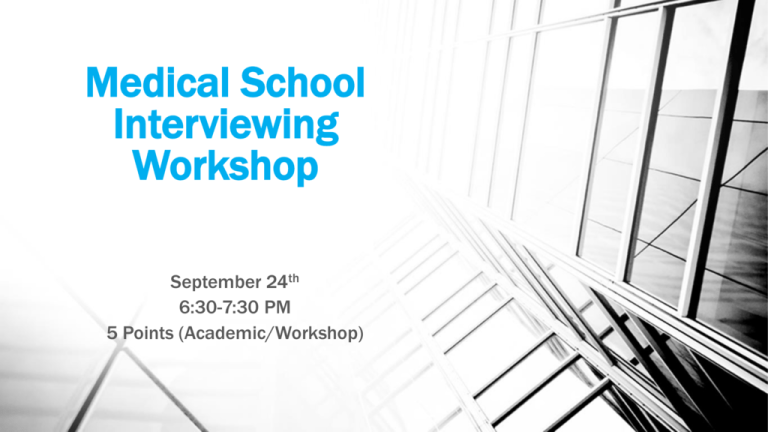
Medical School Interviewing Workshop September 24th 6:30-7:30 PM 5 Points (Academic/Workshop) Format – “Speed Friending” • Review basic facts about UTSW and BCM • Practice Questions • Group A and Group B 1 min discuss things to keep in mind • 3 min (90 sec/person) answer question • 1 min review good/bad answers • Switch groups and repeat • Rules for workshop: • Shake hands at the start • Thank the “interviewer” at the conclusion of the “interview” • Constructively criticize the answers • Act as if you have never met • Be open and honest • NO JUDGEMENT ZONE. What is said here stays here. • This includes information about personal hardships, grades, or anything personal that is shared with you. General Tips • • Yes: • Maintain good posture • Sustain eye contact • Be sincere and show your passion • Talk slowing and enunciate clearly • Prepare beforehand • Be polite (Yes ma’am, yes sir) • Thank them for their time • Shake hand firmly Avoid: • “like,” “uhm,” and “you know.” • fidgeting, playing with hair, and other extraneous movements. • “Do you know what I mean?” and “Does that make sense.” Say instead, “Did I answer your question?” UT Southwestern Medical School What are they known for? UTSW Quick Facts • • • • • • • • US News and World Report: #25 Location: Dallas, TX Class Size: ~230 Tuition • • Resident - $20,441 Non-resident: $33,512 • • GPA: 3.8 MCAT: 33.7 • • #1 choice: >50% Top 3 Choices; >85% • • • • Parkland (county, Level 1 trauma center) UT Southwestern University Hospitals (Zale Lipshy & Clements University Hospital) Children’s Medical Center Dallas VA Averages USMLE Pass Rates/Mean Score: 99%, 236 Match Rates Affiliated Hospitals UTSW Curriculum Pre-Clerkship: 1.5 years, Post-Clerkship: 2.5 years Grading Scale: P/F Scholarly Activities (research project) Graduation Distinctions • Research • Healthy Policy • Global Health • Quality Improvement and Patient Safety • Dual Degree Programs • MD/Ph.D • MD/MBA • MD/MPH • Colleges • 40 people/college • 5-6 people/mentor • • • • Baylor College of Medicine What are they known for? BCM Quick Facts • • • • US News and World Report: #21 Location: Houston, TX (in The Medical Center) Class Size: ~185 Tuition • • • Averages • • • • Resident - $6,550 Non-resident: $19,650 GPA: 3.84 MCAT: 11.37/section USMLE Pass Rates/Mean Score: 100%, 243 Affiliated Hospitals • Texas Children’s, MD Anderson, DeBakey VA, Ben Taub General Hospital (County), Memorial Hermann (Level 1 trauma center), Menninger Clinic (psych), Children’ San Antonio BCM Curriculum • Fall I • Integrated traditional medical school classes (biochemistry, contains integrated material from the traditional disciplines of Biochemistry, Genetics, Molecular Biology, Physiology, Gross and Microscopic Anatomy) • Patient, Physician, and Society • Spring: • Principles of Pathology and Immunology • Pharmacology • Head and Neck Anatomy • Nervous System • Components of Infectious Disease • Behavior Sciences • Bioethics • Patient, Physician, and Society • Fall II • Organ-based teaching, including pathophysiology, pathology, and pharmacology • Patient Safety • Transitions to Clinical Rotations • • • Pre-Clerkship: 1.5 years, Post-Clerkship: 2.5 years Grading Scale: P/F Dual Degree Programs • MD/Ph.D • MD/MBA • MD/MPH • MD/JD • No required research, but opportunities if desired • Specialized Tracks: • • • • • • • • Medical School Research Global Health Care for the Underserved Geriatrics Medical Management Medical Ethics Space Medicine Genetics Interview Day Formats • • UTSW • 25 minute “conversations” • 1 open/1 closed interview • Day before: rounds in the hospital, lunch with students, hospital tour • Day of: breakfast, presentations, interviews, lunch, hospital tour, UTSW tour BCM • 30 minute interviews • Open interviews • Students could interview you – take this seriously! • BCM tour, affiliated hospital tours, lunch Questions! Keep in mind… • Be relaxed • The interviewers truly do want to get to know you. • Have several things to reference for questions for when you draw a blank • • Ex: meaningful leadership, service, personal experiences, etc. Some interviewers have your entire application and others have only your essays. • UTSW: 1 open, 1 blind interview • BCM: both open **UTSW – Tell me about yourself. • Often the first question if it is a closed interview • Tips: • Start with family, where you grew up, what you enjoyed in high school • Talk about how you became interested in medicine • Talk about Baylor, your major (why you chose it), experiences while at Baylor • Talk about what you do for fun – they want to know that you are the pre-med that only studies • Don’t be alarmed if they stop to ask questions, this is a good thing because they are interested in you! UTSW – Tell me about your research. Why did you do research? Do you plan to continue or did you only do it for your application? What makes data “good?” • Tips: • If you did research, be prepared to talk about it, especially at the researchoriented schools • Be knowledgeable in the subjects that you researched BCM: I am your patient. Explain your research to me. • They want to know that you really understand what you are studying. • Use plain terms. **UTSW/BCM: What do you do for fun? What is the last book you read? • Tips: • Read a book for fun before you start interviewing • Take time to relax – 30 minutes a day doing something you love will not kill you • Rediscover something you loved to do in high school. • Join a club that allows you to explore what you love. • Think of specific examples of what you do with your hobbies Why did you apply to UTSW/BCM? • Tips: • Research each school prior to the interview and have several facts in mind that you could reference • Be genuinely happy about your interview • Talk about personal experiences (ex: talking to students, internships, etc.) **UTSW/BCM: Why do you want to be a doctor? What specialty are you interested in? • They may have your personal statement, but they want to know that the person on paper is the person you are in real life. • Be open, honest, and share your experiences. Stay genuine • DO NOT LIE! They are experienced interviewers and will be able to tell. • Don’t say: “to help people” or “I love science” or “doctors make a lot of money” – go deeper and really figure out why. • • This could be a learning experience for you and allow you to rediscover your passion. Show that you have thought about your future • Why that field? Specific experiences, people you know, etc • How do your skills fit with that field? **UTSW – What is the most controversial issue in medicine today? If you could go talk to Obama today and take 3 people with you to discuss this issue, who would you take? • Tips • get the CNN app and have notifications turned “on” • Research a couple of medical issues to talk about • EX: Obamacare (a MUST) or vaccines • Be general: types of people, be sure to include all sides of the issue • Express your POV on the subject and stick to your guns! Sometimes they will play Devil’s advocate and try to make you change – don’t do it! **UTSW: What would your friends say is your general weakness? • Tips: • Actually ask your friends • Turn the weakness into a strength by showing how you are trying to improve the weakness (give specific examples) **BCM - What are you most proud of in your college career? • Talk about why you joined, what you have learned, and why you love it now. • Examples: • An organization or event that you started • A service event you have continuously attended • A time when you helped someone • Maintaining good grades while working, etc. **BCM: What is the most intense medical experience you have encountered? • Tips: • Show that you have medical experience (shadowing, working, volunteering) • You may be asked how you would handle it differently **BCM – What are 3 qualities that are essential for doctors to have? • Show that you have experience and understand what it takes to be a physician • Give examples of why you think those qualities are important **BCM: Tell me about a difficult experience, how you recovered, and how you have/will use that knowledge in the future. • Be ready to discuss weaknesses, how you have learned from them Extra Questions • • BCM: What has been your favorite class? • Maybe give favorite science and non-science class • Show that you are not only about science classes BCM: What would you do with an empty room in your house? Decorations, etc. • Show the things that you are passionate about
